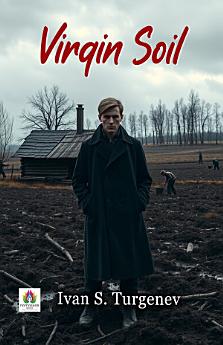Virgin Soil
About this ebook
At its center is the character of Sanin, a young and idealistic gentleman who embodies the spirit of the new Russia — one yearning for progress. As Sanin engages with the complexities of love and personal responsibility, readers are transported through his internal conflicts and external challenges. The allure of the idealistic future clashes with the harsh realities of the present as he navigates his emotions towards the beautiful and spirited Paula, a strong-willed peasant girl who captures his heart. Their relationship becomes a microcosm of the broader societal debates regarding land, labor, and the past and future of Russia itself.
Turgenev paints a vivid portrait of the rural landscape and the people who inhabit it, imbuing the narrative with empathy and understanding. The interactions between Sanin and the other figures around him, including his friends and fellow intellectuals, highlight the generational conflict between the old ways and the emerging new order. These dialogues serve to critique the established norms and exploring the shifting ideals of love, duty, and social responsibility, urging readers to question their beliefs. Through these botched encounters, Turgenev subtly comments on the harsh realities of peasant life within the context of radical change.
The elegance of Turgenev's literary style illuminates the emotional depth of human relationships, with lyrical descriptions of nature providing both beauty and a sense of confinement. The rural scenery is not merely a backdrop but also serves as a character in its own right, representing the rustic beauty and harshness of the Russian countryside. Turgenev skillfully employs intricate symbolism and metaphors of blooming and decay, deftly correlating with the characters’ personal journeys. His nuanced observations invite readers to reflect on the intersections of nature and humanity, ultimately posing questions about existence and the forces that shape our lives.
Virgin Soil is not simply a novel about love and longing; it is a profound treatise on social issues, catalyzing a rich discourse on the responsibilities of individuals toward their community. Turgenev challenges readers to contemplate the interplay between idealism and practicality within the context of social transformation. The epilogue ties together the threads of hope and despair, leaving a lingering sense of introspection that resonates well beyond the final page. This complex blend of themes ensures that Turgenev's work maintains its relevance, continuing to speak to readers across generations.
In summary, Virgin Soil is a remarkably crafted narrative that not only entertains but also provokes thought about the weight of responsibilities inherent in personal relationships balanced against societal expectations. Ivan S. Turgenev’s insights into the human condition and the socio-political landscape of Russia provide an invaluable lens through which modern readers can engage with the past, challenge their perspectives, and appreciate the intricacies of human connection. This literary classic remains a powerful exploration of love, sacrifice, and the relentless pursuit of change, making it a must-read for anyone who cherishes profound literature.






